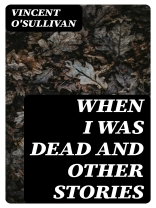In ‘When I Was Dead and other stories, ‘ Vincent O’Sullivan crafts a collection that intricately weaves together themes of mortality, identity, and the blurred boundaries between life and the afterlife. His literary style is characterized by a blend of symbolism and lyricism, presenting narratives that challenge the reader to reflect on the deeper existential questions that underpin human experience. Positioned within the modernist literary context of the early 20th century, O’Sullivan’s prose resonates with echoes of existentialism and a profound questioning of reality, inviting readers into the minds of characters grappling with their existence in a world rife with uncertainty. O’Sullivan, a prominent figure in New Zealand literature, was not only a writer but also a poet and playwright, deeply influenced by the cultural and societal shifts of his time. His diverse background—having lived in both New Zealand and Europe—imbued his work with a rich tapestry of experiences and perspectives. This cosmopolitan outlook likely informed his exploration of transcendent themes in ‘When I Was Dead, ‘ as he sought to bridge personal and universal aspects of human life, illuminated by his own encounters with varying cultures and philosophies. I highly recommend this collection to readers who appreciate thought-provoking literature that challenges conventional narratives. O’Sullivan’s exquisite storytelling and philosophical depth will resonate with anyone interested in the intricacies of existence and the intersection of life and death, making ‘When I Was Dead and other stories’ a profound addition to any literary library.
عن المؤلف
Vincent O’Sullivan (1868-1940) was an esteemed American-born writer, primarily recognized for his contribution to the genre of horror and supernatural fiction. A contemporary of Oscar Wilde and a figure within the aesthetic movement, O’Sullivan transitioned from the United States to Europe, where he found the milieu more conducive to his literary inclinations. His distinct narrative voice combines darkly gothic elements with a profound insight into the aberrations of the human psyche, a combination which is brilliantly showcased in his collection ‘When I Was Dead and other stories’. This compilation of tales, noted for its exploration of the macabre and the bizarre, encapsulates O’Sullivan’s penchant for blending the morbid with sardonic humor. O’Sullivan’s works maintain an enduring appeal to aficionados of horror literature, and his contributions to the genre have been acknowledged as precursors to the more modern psychological horror. His literary style meshes the ornate decadence of the late 19th century with a crispness of prose that anticipates the 20th century’s leanings towards brevity and ambiguity, making his work an intriguing bridge between literary epochs.












